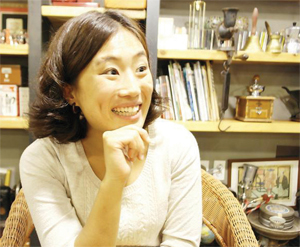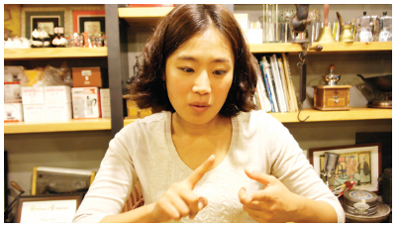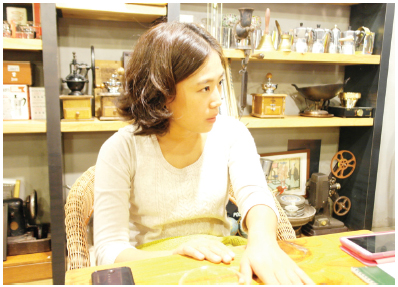
What specifically do you do?
I work for OD Musical Company. There are mainly three departments in the company: planning, production, and marketing. I work in the production department, where I work as a producer of musicals. The planning department decides which musicals to hold and when, and raises funds from investors. Once everything is planned out, this is where I begin my job. The production department organizes how the musical is going to be performed and supervises the musical from its production to its last performance on stage. Particularly, since my position is a producer, I basically direct every small part of the musical from determining how many lights will be installed on stage to what the shape of wigs will be like, and to do so, I constantly have to communicate with choreographers, lighting directors, costume designers and all other staff members.
You went to a university in America and came back to Korea to attend UOS, specifically the Dept. of English Language and Literature. Now you are working at a musical production company. Is there any reason that you have walked such various paths in your life?
I have had a big interest in plays and music since I was young. A musical is something that combines both the characteristics of a play and that of music, so musicals have always been my greatest interest. However, I did not plan to have a career in this field from the beginning. I wanted to major in philosophy at a university, but when I came across plays written by Bertolt Brecht, I wanted to study plays more in-depth so I went to study abroad in America. As I was studying there, surprisingly my musicality began to stand out, and this eventually led one of my high school teachers to introduce me to a professor at a college of music, where I majored in conducting.
Before I graduate from the college, however, I came back to Korea. Since I was not able to transfer from the college of music in America to one in Korea, I entered the Dept. of English Language and Literature at UOS. It was a coincidence that soon after I entered the department, I got to know that there was a small club, the English Drama Research Association (E.D.R.A.), which produces musicals; all planned, produced and acted by students in the Dept. of English Language and Literature. I took charge of directing musicals such as Chicago and Rent in E.D.R.A. since I had experience conducting an orchestra.
At this point, I had my mind set on choosing a career path in the field of musicals, but it was not easy to get a job since I majored in English Language and Literature and I had no experience producing musicals outside of UOS. I was rejected every time I submitted my resume until I was fortunately hired by the OD Musical Company. And now, here I am.

As I said before, it was really a coincidence that I started taking part in E.D.R.A. At first, one of the seniors in my department asked me to help him with putting a show on stage in E.D.R.A. and I helped him with small parts. When I heard E.D.R.A. had performed I Love You, You're Perfect, Now Change, Man of La Mancha and many other famous musicals, I actually began to have interest in this club and eventually took charge of directing the musical Chicago. I still help E.D.R.A., directing their musicals, and recently, I took part in producing the E.D.R.A.’s latest show, Hedwig and the Angry lnch as a musical director.
As a director, you have to constantly communicate with different staff members, but what do you do when there is a conflict between you and them?
First, I do not easily lose my temper. Also, I try to communicate with the staff members as much as possible. I am very straightforward, so if there is any problem, I go up to them to directly address the problem and try to resolve it by talking with them. However, if I still have problems after doing so or if a person does not want to talk with me, I just let the problems or the person be the way they are. You cannot make everything the way you want it to be. Sometimes you should give up on some things you cannot change.
How much time does it usually take to produce one show?
It usually takes about three months. However, my job is not done even after one show is over. Usually one musical is held many times at different places and you have to keep working with every show, so actually there is no break. The show you are going to take charge of is usually the first show you assume when you begin your job, because the producer has to know basically everything about the show: the show’s history, plot, setting, stagecraft and such. Thus, it is very difficult to replace the producer with another one. In my case, the musical Grease was the first show I was assigned to direct after I joined the OD Musical Company, so I still am in charge of producing Grease.

Since I have been working as a musical producer, I realized that a musical itself is one big business. I have also begun to see what is beyond musicals after meeting and interacting with different people through musicals. Although I am working in the field of musicals right now and learning how to produce and direct shows, when I quit my job I want to work in the film industry. It is a big world and there is a lot to be done.
There is no one or no book that tells you how to become a musical producer because the job and the musical field are generally considered a ‘Blue Ocean’ in Korea. What would you want to tell those UOS students who are considering to pursue a career in such field but are concerned about having no guidelines for their goals?
You do not have to be concerned about having an unclear future concerning what you want to do or how much you will struggle while pursuing your goal in such an unpopular field. If you want to stop pursuing your goal because it is too tough, then you were never meant to walk that path. However, if you are still trying hard to pursue your dream no matter how hard it is, you will walk to the end and achieve your goal. You just need to do your best while walking your path in the given circumstances. In the end, it is not the moment you accomplish your goal which makes your life meaningful, but the genuine meaning of life lies in the process of looking for ways to achieve your dream.
All photos credited by Kim You-jin
Kim You-jin Editor-in-Chief
cleo9207@uos.ac.kr

